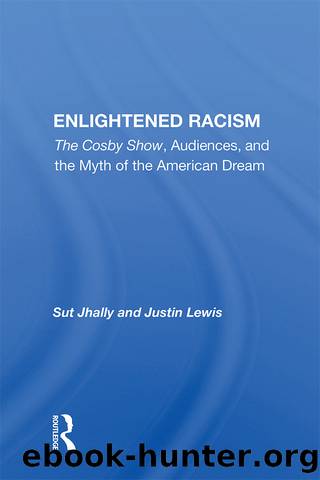Enlightened Racism by Sut Jhally

Author:Sut Jhally [Jhally, Sut]
Language: eng
Format: epub
Tags: Social Science, Popular Culture
ISBN: 9780813314181
Google: QJGFAAAAIAAJ
Publisher: Avalon Publishing
Published: 1992-06-28T03:21:37+00:00
Class Consciousness: The View from above
Even in the simple act of watching television, the ideological effect of the American dream, for all its democratic rhetoric, is anything but egalitarian. It offers wealthier citizens the comfort and satisfaction of feeling included but forces poorer people to denigrate their own lot, and ultimately, to denigrate themselves for having failed. It is, however, within these limited ideological parameters that most people in our study spoke about class. The way we see class on television, in other words, depends on the class position we are watching from.
All our groups were asked, for example, how they would feel if The Cosby Show were about a lower middle class or blue-collar family. Though many respondents, particularly whites, responded negatively to the idea, a few actually embraced it. We might expect such a reaction from middle class viewers, but we might have anticipated a rather different response from the working class groups, who would, after all, have more in common with a less affluent family. Although middle class viewers enjoyed seeing themselves reflected on the screen, most working class or lower middle class viewers simply did not want to see a family that was, in a material sense, more like them.
The viewers in the best position to regard an upper middle class family like the Huxtables as normal and typical are, of course, those from middle or upper middle class backgrounds. Such respondents, as one might expect, clearly enjoyed the ease with which they felt able to identify with or relate to the show. When offered the prospect of transforming the Huxtables into a blue-collar family, most responded uncomfortably. As one respondent put it, far better to keep it "sophisticated" and "select," to watch what another referred to as "classy" people. Black upper middle class viewers, as one might expect, had a particular stake in the show's portrayal of black professionals (which we discuss in more detail in Chapter 7). More prosperous white groups, for their own reasons, also expressed doubt about the prospects for a blue-collar Cosby Show, as this respondent did:
I don't think it would be funnier. I think it would probably be less funny [because] I think it's just a higher level of humor and situations than the other shows.
For these white respondents, this class preference was not simply a question of money; it involved a level of cultural competence (or "sophistication") that is understood as class related. Most were shy about stating this point too explicitly, preferring to talk about the things they have in common with the Huxtables, as in the following exchange:
MAN: I think I enjoy the program more because he is a doctor, she is a professional.
WOMAN: Identifying . . .
MAN: We're both professionals. Our kids are going to go to college, their kids go to college.
WOMAN: It's just the situations.
MAN: For me, watching the program, I enjoy it more.
WOMAN: I can identify.
MAN: Because they're kind of like me!
INTERVIEWER: And you feel the same way?
WOMAN: Sure, I think it's just a higher level of humor and situations than the other shows.
Download
This site does not store any files on its server. We only index and link to content provided by other sites. Please contact the content providers to delete copyright contents if any and email us, we'll remove relevant links or contents immediately.
Lois & Clark: A Superman Novel by C. J. Cherryh(768)
Film Studies: An Introduction (Film and Culture Series) by Ed Sikov(699)
Cinematography: Theory and Practice by Brown Blain;(628)
The Making of Star Wars (Enhanced Edition) by Rinzler J. W(587)
On directing film by Mamet David(581)
Film Studies by Ed Sikov(557)
Digital Compositing for Film and Video by Steve Wright(540)
True Blue by David Baldacci(522)
Baldacci, David - True Blue by Baldacci David(516)
Modern Nature by Derek Jarman(503)
Hitchcock by Rothman William(493)
Free Play: Improvisation in Life and Art by Stephen Nachmanovitch(477)
Film Lighting by Kris Malkiewicz(467)
The Men who Made the Movies by Schickel Richard(447)
When I Stop Talking, You'll Know I'm Dead: Useful Stories From a Persuasive Man by Jerry Weintraub(434)
iMovie: The Missing Manual by David Pogue and Aaron Miller(396)
The After Effects Illusionist by Perkins Chad(380)
Four Screenplays by Syd Field(378)
After Effects Apprentice, by Meyer Chris Meyer Trish(348)
